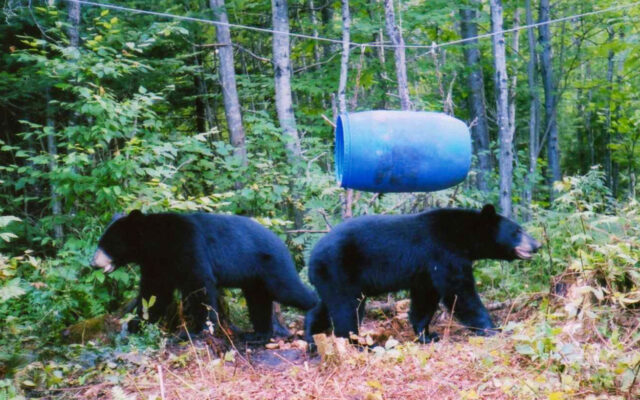
Maine’s bears are fat and healthy. That’s bad news for hunters.
By Pete Warner, Bangor Daily News Staff
If you have been out and about this summer, you likely have enjoyed the abundance of wild blueberries, raspberries and blackberries.
Or maybe you’ve noticed that the oak trees in your area are laden with acorns or that there are lots of nuts on the beech trees.
Maine’s black bears are taking full advantage of the widespread availability of berries and mast on the landscape. That means bears are expected to head to their dens fat, healthy and prepared to survive the winter months.
But what is good news for the bears can mean increased frustration for hunters.
With the annual season set to begin on Saturday, Aug. 28, with Youth Bear Hunting Day and the general season scheduled Aug. 30 through Nov. 27, hunters should expect to have a more difficult time bagging a bear in 2021.
Jennifer Vashon, the state black bear and Canada lynx biologist for the Maine Department of Inland Fisheries and Wildlife, said conditions are favorable for bears.
“They’re always going to prefer natural food over human sources of food, including bait,” Vachon said. “In a really good food year, we typically see a reduction in harvests.”
Vashon said bears are wired to avoid taking the risk of coming into contact with humans, including visiting a baited location. That said, they’re more willing to visit homes in the spring and early summer to take advantage of bird feeders and unstored garbage cans and barbecue grills, because their natural food is in limited supply.
In years when berries, nuts and other food are less readily available, bears are hungry and more willing to risk encountering humans.
That was the case during 2020 and hunters cashed in, harvesting 3,883 bears using all legal methods — baiting, dogs, trapping and spot-and-stalk.
Vashon said the harvest was the fifth largest since the DIF&W first classified bears as big game animals in 1969 and was the highest since 2004, when 3,921 bears were taken. The record harvest was 3,951 in 2000.
Last year, not only was the food supply diminished, but there was a significant increase in the number of hunters. Vashon said there were 12,000 bear hunters registered, approximately 2,000 more than average.
The pandemic, which closed businesses and forced people to socially distance, also probably played a factor in putting more hunters in the woods.
Vashon said biologists were concerned earlier this year about drought conditions that existed in many parts of Maine. Had they persisted, bears would have been adversely affected.
In 2020, dry weather and less natural food led to more young bears dying. Many 1-year-olds were unable to eat enough during the summer and fall to gain sufficient weight to survive the winter in the den. Some of those that did reemerge this spring were underweight.
“Those bears, their job is to put all their energy into growth,” Vashon said. “When there’s not a lot of food out there on the landscape, those bears are the most vulnerable to mortality.”
The hope is that this year’s beneficial weather and food supply will ensure that more young bears survive next winter.
As for this season, while plentiful food for bears could hamper the efforts of hunters using bait, dogs and trapping, there could be some late-season sightings in November.
“When natural foods are out, they stay out longer,” Vashon said. “We could see more opportunity for people seeing a bear while hunting deer.”
Vachon pointed out that licensed big game hunters in Maine are entitled to harvest a bear during the regular firearms season for deer, which runs Oct. 30 to Nov. 27.
Hunters who would like an earlier crack at bears may use spot-and-stalk techniques, such as with deer, throughout the bear hunting season. From Aug. 30 to Oct. 29, a hunter holding a valid big game license can purchase a separate permit, which costs $27 for residents and $74 for nonresidents (for the entire season).
There also is a nonresident late season permit ($40, in addition to a big game license) for those who wish to hunt bear only during the firearms season on deer.
Biologists estimate Maine’s bear population to number 36,000.